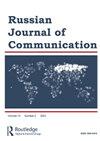网络侵略的数字空间:莫斯科人对移民的看法
Q1 Social Sciences
引用次数: 0
摘要
摘要:本文分析了数字环境中莫斯科移民和居民之间的语音感知和交流的具体性质。主要重点是引发冲突的数字区域,以及预测和预防冲突的方法。开发预测用户可能的行为、冲突的发生和预防的算法是跨学科研究的重要任务。通过对社交媒体数据的分析,实现了研究的目标。采用神经网络建模、统计分析和微分方程等研究方法。在数学建模方面,建立了三种类型的模型:线性回归方程、逻辑模型和类型流行病学数学模型。研究表明,利用微分方程、数理统计和神经网络技术的并行模型来确定攻击性在线活动的动态,特别是分析用户对与移民主题相关的冲突情况的感知,可以正确分析现代大都市发展中的冲突区域,提高研究方法和预测分析社会紧张局势发展的有效性。本文章由计算机程序翻译,如有差异,请以英文原文为准。
Digital spaces of network aggression: Muscovites ‘ perception of migrants
ABSTRACT The paper presents the analysis of speech perception and of the specific nature of communication between migrants and residents of Moscow, as reflected in the digital environment. The main focus is on conflictogenic digital zones, as well as methods for predicting and preventing conflicts. The development of algorithms to make predictions about users’ possible actions, the occurrence and prevention of conflicts is an important task of interdisciplinary research. The goals of research were achieved based on the analysis of social media data. Neural network modeling, statistical analysis, and differential equations were used as research methods. In mathematical modeling, three types of models were built: an equation of linear regression, as well as logistic and type-epidemiological mathematical models. The study showed that the use of parallel models using differential equations, mathematical statistics and neural network technology to determine the dynamics of aggressive online activity, in particular, to analyze users’ perception of conflict situations related to the topic of migrants, makes it possible to correctly analyze conflict zones in the development of a modern metropolis, to increase the effectiveness of research methods and predictive analytics of the development of social tension.
求助全文
通过发布文献求助,成功后即可免费获取论文全文。
去求助
来源期刊

Russian Journal of Communication
Social Sciences-Political Science and International Relations
自引率
0.00%
发文量
0
期刊介绍:
Russian Journal of Communication (RJC) is an international peer-reviewed academic publication devoted to studies of communication in, with, and about Russia and Russian-speaking communities around the world. RJC welcomes both humanistic and social scientific scholarly approaches to communication, which is broadly construed to include mediated information as well as face-to-face interactions. RJC seeks papers and book reviews on topics including philosophy of communication, traditional and new media, film, literature, rhetoric, journalism, information-communication technologies, cultural practices, organizational and group dynamics, interpersonal communication, communication in instructional contexts, advertising, public relations, political campaigns, legal proceedings, environmental and health matters, and communication policy.
 求助内容:
求助内容: 应助结果提醒方式:
应助结果提醒方式:


